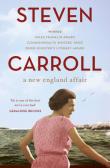 8495688465340596502.png
8495688465340596502.png
 8495688465340596502.png
8495688465340596502.png
'Why do some nights feel as though they were always waiting to happen? Or have already happened and will again? And why don't we know it then? Why is it only afterwards we say, yes, that was when my life turned?'
'1965. The great poet, TS Eliot, is dead. Hearing the news, the seventy-two year old Emily Hale points her Ford Roadster towards the port of Gloucester, where a fishing boat will take her out to sea, near the low, treacherous rocks called the Dry Salvages, just off Cape Ann, Massachusetts. Over the course of that day, clutching a satchel of letters, Emily Hale slips between past and present, reliving her life with Eliot – starting with that night in 1913, the moment when her life turned, when the young Tom Eliot and Emily Hale fell deeply in love with each other. But Tom moved to London to fulfil his destiny as the famous poet ‘TS Eliot', and Emily went on to become his muse – the silent figure behind some of the greatest poetry of the 20th century – his friend and his confidante. But never did she become his lover or his wife.' (Publication Summary)
'This is the third novel in Steven Carroll’s T. S. Eliot collection, inspired by the poet’s famous Four Quartets series. Here, he interrogates the perspective of Eliot’s secret platonic mistress, the somewhat doomed Emily Hale, who we meet as a lonely eccentric self-described spinster in her late 70s, reflecting on the love that never was. The novel moves between the present-day Hale in 1965, having just learnt of Eliot’s death, to the beginnings of their celibate affair in 1913, and meanders off momentarily into a benign subplot involving two younger characters named Grace and Ted that does very little to enlighten or enhance an otherwise compelling narrative.' (Introduction)
'In his fiction, Steven Carroll stretches and slows time. He combines this with deliberate over-explaining and repetition, the echoing of memories and ideas, coincidence, and theatricality. A distinctive rhythm results: when reading his work, I often find myself nodding in time to the words. Occasionally – and it happens now and again in his new novel, A New England Affair – the prose starts to resemble a pizza with too many toppings. Mostly, though, Carroll’s approach to fiction succeeds even when it seemingly shouldn’t. If it’s a mystery – a minor miracle, even – that the various techniques he employs come together to create stylised and yet fresh prose, then that mystery itself becomes part of the pleasure of reading a Carroll novel.' (Introduction)
'In his fiction, Steven Carroll stretches and slows time. He combines this with deliberate over-explaining and repetition, the echoing of memories and ideas, coincidence, and theatricality. A distinctive rhythm results: when reading his work, I often find myself nodding in time to the words. Occasionally – and it happens now and again in his new novel, A New England Affair – the prose starts to resemble a pizza with too many toppings. Mostly, though, Carroll’s approach to fiction succeeds even when it seemingly shouldn’t. If it’s a mystery – a minor miracle, even – that the various techniques he employs come together to create stylised and yet fresh prose, then that mystery itself becomes part of the pleasure of reading a Carroll novel.' (Introduction)
'This is the third novel in Steven Carroll’s T. S. Eliot collection, inspired by the poet’s famous Four Quartets series. Here, he interrogates the perspective of Eliot’s secret platonic mistress, the somewhat doomed Emily Hale, who we meet as a lonely eccentric self-described spinster in her late 70s, reflecting on the love that never was. The novel moves between the present-day Hale in 1965, having just learnt of Eliot’s death, to the beginnings of their celibate affair in 1913, and meanders off momentarily into a benign subplot involving two younger characters named Grace and Ted that does very little to enlighten or enhance an otherwise compelling narrative.' (Introduction)